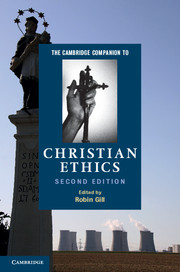Book contents
- Frontmatter
- Part I The grounds of Christian ethics
- Part II Approaches to Christian ethics
- Part III Issues in Christian ethics
- 13 Christianity and war
- 14 The arms trade and Christian ethics
- 15 Social justice and welfare
- 16 Ecology and Christian ethics
- 17 Business, economics and Christian ethics
- 18 World family trends
- 19 Sexuality and religious ethics
- 20 Christian ethics, medicine and genetics
- Select bibliography
- Index
19 - Sexuality and religious ethics
from Part III - Issues in Christian ethics
Published online by Cambridge University Press: 28 January 2012
- Frontmatter
- Part I The grounds of Christian ethics
- Part II Approaches to Christian ethics
- Part III Issues in Christian ethics
- 13 Christianity and war
- 14 The arms trade and Christian ethics
- 15 Social justice and welfare
- 16 Ecology and Christian ethics
- 17 Business, economics and Christian ethics
- 18 World family trends
- 19 Sexuality and religious ethics
- 20 Christian ethics, medicine and genetics
- Select bibliography
- Index
Summary
Thirty years ago Alasdair MacIntyre made his seismic challenge to moral theory in After Virtue:
The most striking feature of contemporary moral utterance is that so much of it is used to express disagreements; and the most striking feature of the debates in which these disagreements are expressed is their interminable character. I do not mean by this just that such debates go on and on and on – although they do – but also that they apparently can find no terminus. There seems to be no rational way of securing moral agreement in our culture.
As an example of such interminable debate he set out the following different positions on abortion :
(a) Everybody has certain rights over his or her own person, including his or her own body. It follows from the nature of these rights that at the stage when the embryo is essentially part of the mother's body, the mother has the right to make her own uncoerced decision on whether she will have an abortion or not. Therefore abortion is morally permissible and ought to be allowed by law.
(b) I cannot will that my mother should have had an abortion when she was pregnant with me, except perhaps if it had been certain that the embryo was dead or gravely damaged. But if I cannot will this in my own case, how can I consistently deny to others the right to life that I claim for myself? I would break the so-called Golden Rule unless I denied that a mother has in general a right to an abortion. I am not of course thereby committed to the view that an abortion ought to be legally prohibited.
(c) Murder is wrong. Murder is the taking of innocent life. An embryo is an identifiable individual, differing from a newborn infant only in being at an earlier stage on the long road to adult capacities and, if any life is innocent, that of an embryo is. If infanticide is murder, as it is, abortion is murder. So abortion is not only morally wrong, but ought to be legally prohibited.
- Type
- Chapter
- Information
- The Cambridge Companion to Christian Ethics , pp. 271 - 286Publisher: Cambridge University PressPrint publication year: 2011

